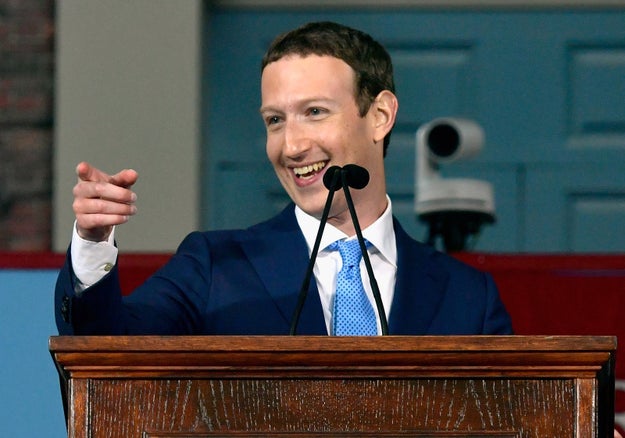
Paul Marotta / Getty Images
Mark Zuckerberg has said he’s not running for president. And maybe he’s not. But the 33-year-old Facebook CEO laid out a clear political platform in a commencement speech at Harvard Thursday.
Zuckerberg’s message was far from subtle: He positioned himself as the anti-Trump, preaching a form of compassionate globalism that could make a system of free trade and open immigration work for those it’s left behind — a stark contrast from President Trump’s inward-looking approach.
“This is the struggle of our time,” Zuckerberg told the crowd. “The forces of freedom, openness, and global community against the forces of authoritarianism, isolationism, and nationalism. Forces for the flow of knowledge, trade, and immigration against those who would slow them down. This is not a battle of nations, it's a battle of ideas.”
It was difficult, if not impossible, to hear these words without conjuring Trump’s proclamation from his inaugural address: “From this moment on, it’s going to be America First.” Zuckerberg's were the opposite.
Zuckerberg hasn’t shied away from expressing his dismay about the resurgence of nationalism across the globe — one that helped Trump get elected in the US, Brexit become reality in Britain, and Marie Le Pen force a runoff in France. “I hope that we have the courage to see that the path forward is to bring people together, not push them apart,” he said in a keynote at Facebook’s F8 conference last year.
And he isn’t hiding his desire to put Facebook to work to help improve the global system, so more people will buy in. “The most important thing we at Facebook can do is develop the social infrastructure to give people the power to build a global community that works for all of us,” Zuckerberg said in a letter titled “Building Global Community” in February.
But Zuckerberg also appears to understand it will take more than one technology company to solve the widespread job loss and income inequality largely blamed on the global system. Making it work “for everyone,” as Zuckerberg put it, is no easy task.
Zuckerberg formed the Chan Zuckerberg Initiative with his wife Priscilla Chan, in part, to help. He will donate nearly all his money to the initiative, whose stated goals are “advancing human potential and promoting equal opportunity.” But he won’t stop there.
The Harvard speech appeared to be a moment for Zuckerberg, who created Facebook in a dorm room not far from the commencement ceremonies, to lay out a number of policy positions he believes will create better global systems. But implementing these policies requires government — Facebook or the Chan Zuckerberg initiative don’t have the power to accomplish it on their own.
Zuckerberg addressed economic inequality, for instance. “There is something wrong with our system when I can leave here and make billions of dollars in 10 years while millions of students can't afford to pay off their loans, let alone start a business,” he said. To help, he proposed exploring universal basic income, providing affordable childcare, and offering healthcare not tied to a single employer.
He discussed immigration, tearing up when speaking about an undocumented student interested in social justice. “It says something about our current situation that I can't even say his name because I don't want to put him at risk,” Zuckerberg said. “If a high school senior who doesn't know what the future holds can do his part to move the world forward, then we owe it to the world to do our part too.”
Zuckerberg also discussed technological automation, a major economic concern that candidates barely acknowledged during the 2016 election. “Our generation will have to deal with tens of millions of jobs replaced by automation like self-driving cars and trucks,” Zuckerberg said, calling for a “generation-defining public works” shortly afterward.
While the public works programs of the 1930s spent billions to build roads, schools, and airports, Zuckerberg said this generation should be invested in “manufacturing and installing social plans” to help stop climate change, to work to cure disease, and, controversially, to build a system that allows people to vote online. “Let's do big things, not only to create progress, but to create purpose,” Zuckerberg said.
Instead of his go-to grey T-shirt, Zuckerberg wore a suit. He delivered the speech in a more lively, animated, and emotive manner than how he’s spoken in the past. He called on members of the audience to stand up, discussing their personal stories with the crowd as examples of resilience and courage. If Zuckerberg ever runs for office, it will almost certainly look a lot like the man that spoke today. For now though, he’s simply asking for your Like.
Quelle: <a href="Mark Zuckerberg Positions Himself As The Anti-Trump In Speech To Harvard“>BuzzFeed
Published by